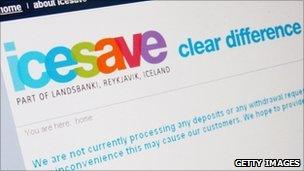Icesave: Icelandic government wins compensation ruling
- Published

400,000 British and Dutch depositors were initially left out of pocket when Icesave collapsed
A European court has cleared the Icelandic government of failing to guarantee minimum levels of compensation for UK and Dutch savers in the collapsed Icesave bank.
Icesave, run by the Icelandic Landsbanki, collapsed in 2008 along with all of Iceland's banking system.
The UK and Dutch savers were bailed out completely by their governments.
The ruling may halt the UK's attempt to get all of its money back from the Icelandic government.
A spokesman for the UK Treasury said: "We note the judgment of the EFTA Court and will study it in detail."
The Icelandic government said it took "considerable satisfaction" from the ruling from the European Free Trade Agreement (EFTA) Court., external
"Iceland has from the start maintained that there is legal uncertainty as to whether a state is responsible for ensuring payments of minimum guarantees to depositors using its own funds and has stressed the importance of having this issue clarified in court," it said.
When Icesave, an online savings bank, went bust in the autumn of 2008 at the height of the international banking crisis, the UK government stepped in.
To maintain public confidence and prevent a run on any other banks, the then UK Chancellor Alistair Darling decided to bail out 230,000 UK savers in Icesave to the full extent of their savings - about £3.5bn - not just to the minimum decreed by European rules for deposit compensation schemes.
At the time, the Icelandic scheme was responsible for the first 20,887 euros (£16,300) of compensation, with that being topped up to then ceiling of £50,000 per person by the UK Financial Services Compensation Scheme (FSCS).
The EFTA judgement stated: "The Court holds that the Directive does not envisage that the defendant itself must ensure payments to depositors in the Icesave branches in the Netherlands and the United Kingdom, in accordance with Articles 7 and 10 of the Directive, in a systemic crisis of the magnitude experienced in Iceland."
The Icelandic government said the failed Landsbanki had in fact already paid out 90% of the maximum compensation it should have paid under the European rules, and would continue with more repayments.
Icelandic saga
Since 2008, the UK government has been thwarted in its attempts to force the Icelandic government to repay all of the compensation the UK had paid to its citizens who had money in Icesave.
At first, in 2009, the Icelandic government agreed to repay the compensation given by the UK and Dutch governments.
However most of the Icelandic people were bitterly opposed to the suggested deal, fearing that it would bankrupt their country and was, in any case, fundamentally unfair because the UK and Dutch governments had awarded compensation far in excess of the levels required by European legislation.
A full-scale constitutional and diplomatic crisis ensued when the country's president refused to ratify the deal and instead called a referendum, which overwhelmingly rejected the deal in March 2010.
A second deal struck between the three governments was followed by a second referendum in April 2011 but this also rejected proposed repayments, though by the much narrower margin of 59% to 41%.
The UK and Dutch governments then threatened to sue for the money - a move which now appears to have hit the buffers.
- Published23 April 2012
- Published16 March 2012
- Published20 February 2011
- Published10 December 2010